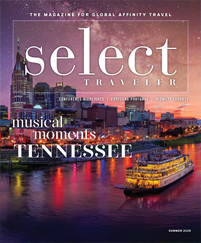Travel is good for the soul, but only if you do it right.
People have long looked to travel to provide opportunities for rest, growth and even personal transformation. And with today’s cultural emphasis on mental health and wellness, more travelers than ever are hitting the road in search of experiences that will have a positive impact on their inner lives.
There’s a mountain of academic research showing travel can indeed boost mental wellness. But unfortunately, many of our current travel habits — especially in the group travel business — may be undermining that positive impact.
Whether you’re thinking about planning a wellness-focused group retreat or simply looking for ways to make your current offerings more meaningful, consider some of these science-backed recommendations.
Log off Social Media
Social media hasn’t just transformed society — it has rewired our brains, and not in a good way. The deleterious effects of social media on mental health have been well documented. So if you want to really help your travelers relax, consider instituting a group-wide social media embargo during a trip. If nobody is thinking about capturing the perfect Instagram pic, it frees everyone in the group to stop worrying what they look like and simply have fun. And if you can get your travelers to give up their reflexive feed scrolling during downtime, you’ll find them having many more meaningful conversations throughout the course of the trip.
Put Phones Away
It’s difficult to overstate how addictive smartphones have become — it’s nearly impossible to use them without becoming hooked. But research shows that taking even a few days away from phone usage can have dramatic mental health benefits. So encourage your travelers to switch their phones off and pack them in the bottom of a carry-on during your trip. You can help make that easier by providing paper maps, disposable cameras and printed itineraries. And make sure loved ones at home know how to reach you during the trip in the unlikely case of a true emergency.
Slow the Pace
There’s a growing “slow travel” movement advocating for relaxed trips with less movement and more time spent exploring local communities. And while this philosophy may not be as practical for groups as for individuals, travel planners can still implement some of its principles to make their trips more relaxing and restorative. Cut down on the number of destinations, attractions or activities on your itineraries and give people more free time. Start the morning’s activities later. Linger over lunch or dinner. Include a day at the beach. Your trips should offer a respite from the frenetic pace of daily life at home.
Get a Guide
Everybody wants travel to be meaningful and restorative. But according to social scientists, most of us are pretty bad at achieving those outcomes during our trips. However, people who participate in guided activities such as hikes, yoga or meditation experience better and longer lasting benefits than people who undertake the same activities on their own. You can leverage this effect by bringing well-trained local guides or coaches to join your trips for some intentional moments of mindfulness, reflection and fun. The guides don’t have to run the entire trip or be present for every activity — just having a few guided mindfulness experiences can dramatically improve travelers’ mental health.
Go Play Outside
You may not think of yourself as an outdoorsy person, and your travelers may rarely venture outside for fun. But scientific research indicates that spending time in nature is one of the best things people can do for their mental health. And if you’re visiting destinations with remote places and picturesque landscapes, you can leverage that scenery to help your travelers feel great. This doesn’t mean forcing people into adventurous activities — something as simple as a slow walk in the woods or a quiet float trip down a river can be just the ticket for a mood boost.









